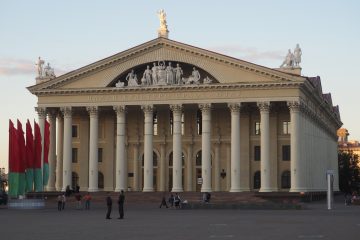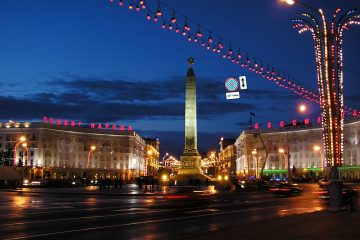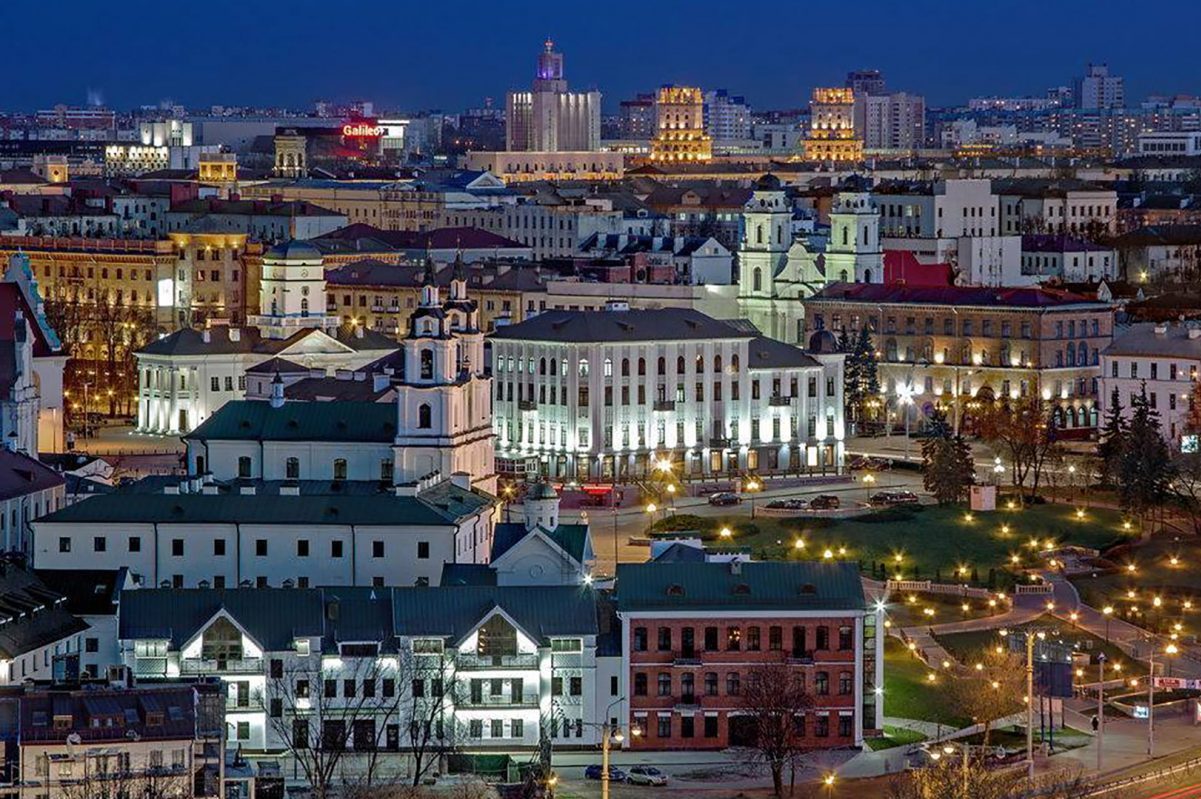Strategy Paper 2015
Presidential elections were held in Belarus on 11 October 2015. As expected, Lukashenka was again elected to the presidency in elections that were, once again, rigged. And once again, new refinements in election manipulation were introduced. Foreign policy considerations suggest that a more positive evaluation of the regime on the European stage would be expedient. Public opinion in the West may be influenced by ostensible improvements in the general electoral environment and election process, without recognizing this as a form of self-deception.
The country’s international context is characterized by strategic uncertainties and a persistently critical economic situation. As the result of recent strategy shifts, the international isolation of Belarus, which began in 1996, has given way to a willingness on the part of the West to engage in some degree of cooperation, which is associated with both opportunities and risks. Proponents of this policy shift like to point to improvements in the election process in October 2015 by way of justification. This rationale undermines the credibility of the West: the elections per se do not give cause to improve in relations to Lukashenka – other strategic grounds, i.e. Western strategic considerations, may justify such policy adjustments.
The official final results of the 2015 presidential elections obfuscated the genuine results, the tampering with electoral registers, and the actual numbers of non-voters. The real atmosphere and the genuine mood changes in the country for the country as a whole would be better reflected in electoral results prior to their manipulation. A wealth of details that emerged during unofficial election observation support the well-founded assumption that Lukashenka received only one half of the votes cast in the capital, that the “against all” option accounted for at least 20% of votes cast in Minsk and that Lukashenka’s challenger, Tatsiana Karatkevich, shown in the official results as receiving 4.43% of votes cast nationwide, actually won around 20% of the votes. The genuine election results for the country as a whole, i.e. the non-manipulated results, may correspond to the breakdown of votes depicted in the results of surveys conducted before the elections by the Independent Institute of Socio-economic and Political Studies (IISPS, Minsk-Vilnius, Professor Manaev).
On the other hand, there is little doubt that the Belarusian population continues to “stick by” Lukashenka because of a belief that social, albeit not economic, conditions in Belarus are better than those in West-ward looking Ukraine. To some extent, Lukashenka, as an uneasy partner for Moscow, represents a guarantee for the country’s independence in the face of Russian yearnings towards subjugation and annexation.
People still harbour the painful memory of the violent measures of repression and persecution pursued in the wake of the presidential election on 19 December 2010 against opposition figures – including officially registered presidential candidates. From that time, the people feared by Lukashenka included political prisoners, whose wrongful imprisonment he used as a deterrent against potential unrest in the country. Nevertheless, in August of 2015, Lukashenka did release the last of the political prisoners still behind prison walls, including Mikalai Statkevich, a “Lukashenka opponent of conscience”. The legal restoration of his rights and reputation (“rehabilitation”), for which there were calls in the West and elsewhere, did not occur.
Belarus and the Russian Federation
With the forcible annexation of Crimea in violation of international law in the spring of 2014 and the creation, with Russian military and economic assistance, of “autonomous” separatist-held regions in eastern Ukraine, Belarus’ strategic position has changed fundamentally relative to the general conditions of 2010, while country’s the financial/economic dependency on Moscow continues:
Lukashenka’s pro-Russian and anti-Western policy over the last two decades has created a pro-Russian clientele in Belarus, one that is becoming potentially dangerous for Lukashenka: Moscow could use it at any time for its own strategic purposes, given the Kremlin’s neo-imperialist policy towards the former Soviet republics. The Belarusian economy is dependent on direct and indirect Russian subsidies. Power politics in Belarus dictate that the Lukashenka government’s economic stance be state-centred, i.e. planned-economy dominated. This has precluded an economic policy that might have attracted direct investment from the West. Sales opportunities in Russia for the products manufactured by Belarus’ outdated state enterprises are diminishing – partly due to the economic recession there. Within the Eurasian Economic Union they are also running into competition from other member states.
Recent Russian state propaganda has met with a positive response among considerable portions of the Belarusian population.
In the face of the decreasing effectiveness of Belarus’ state-controlled social, education and health systems and the falling productivity of the state economy, a private sector geared toward Western markets is taking shape on the basis of individual initiative and without entering into political opposition to the regime. Family-based economically relevant activity in the informal sector is on the rise; this, together with starting occupational activities abroad, could be seen as an attempt to compensate for the deficits in the Belarusian economy, state finances and employment potentials with macroeconomic origins, but it is also exposing Belarusians to new experiences acting on the open market.
Without question, Lukashenka’s international standing was enhanced by the achievement of the shaky ceasefire in eastern Ukraine, the basic outlines of which were agreed, i.e. brokered, in Minsk in February, 2015, by the German Prime Minister and the French President on the one side and President Putin and President Poroshenko on the other. With OSCE participation, the outcome of those negotiations was subsequently transformed into a ceasefire agreement between the parties directly involved in the conflict. Lukashenka is not a party to the agreement, though, and cannot by rights be considered one of its brokers – other than in respect to having hosted the negotiations. In view of the risks the country faces in conjunction with Russia’s newly aggressive stance, the increase in international prestige may nonetheless represent a strengthening, albeit one of limited effect, of his position vis-à-vis Moscow – but also with respect to the West. On various occasions Lukashenka has refused to recognize the annexation of Crimea and the achievement of independence as separate states on the part of two Georgian provinces, not acceding to Moscow’s calls for their recognition. Today the focus of contention with Moscow is on the establishment of another Russian airbase in Belarus and the possible location of such a base in greater or lesser proximity to the border with Ukraine.
The latest opinion surveys in Belarus (July 2015) confirm the downward trend in economic performance and fall in the reliability of social services provided by the State to its citizenry, but they also confirm a persisting preference for closer ties with Russia as opposed to closer ties with the European Union. Hence there is a considerable difference in the strategic orientation between Ukraine and Belarus.
Minsk and the Eastern Partnership of the European Union
Lukashenka’s disinclination to make the effort to attend the Eastern Partnership Summit in Riga – May 2015 – in person was in the interests of both sides.
Lukashenka and Belarus are subject to Western sanctions because of the fact that between 1994 and 1997 Lukashenka made every effort to eliminate the democratic culture emerging in Belarus and replace it with a neo-authoritarian, although not Communist regime – a regime that he continues to sustain with the help of Russian subsidies. The contrast grows ever starker between Lukashenka’s ideas about Belarusian citizens and the impressive way that Belarusians, who grew up with this state-authoritarian system, are navigating and developing their full potential within the political culture of Germany and other EU member states.
With respect to its strategic prospects, the Eastern Partnership will remain largely ineffective until such time as it recalls the European Community’s provision in the Treaty of Rome of 1957, under which that Community is to remain open to the membership of other European states, and asserts the relevance of that provision vis-à-vis Eastern Europe for countries that acknowledge as their own Europe’s political, social, economic and cultural values as they are reflected in the European Union and that are effectively preparing their country for the framework conditions of the European Single Market. By referring to this fundamental decision taken by what were then the six member states of the European Community, the European Union would be proclaiming the legitimacy of the aspirations of other, in this case Eastern European, countries, to one day become members of the EU.
With respect to the Eastern Partnership countries, there is a sense that the European Union – for whatever reason – does not at present wish to call to mind something that is an objective fact, which sews the seeds of distrust. Is this deliberate? The suspicion that it is cannot be brushed aside.
The Paris Charter, signed on 21 November 1990 by the heads of state or government of the countries in Europe and North America involved in the CSCE activities, marked the beginning of a transformation process in Eastern Europe that can be hindered but cannot be stopped by authoritarian, undemocratically established governments and power constellations. It is a historical process leading to the emancipation of citizens from a system of government, law and power that is outdated and is neither socially nor economically sustainable under global conditions as they now stand and one that is based on illegitimately obtained power and forcibly maintained positions of power.
It may be the case that the European Union, in view of the challenges it currently faces (Russia/Ukraine, Euro crisis, movement of refugees), does not at this time have the strength to undertake a fundamental course correction. This constitutes a temporary phenomenon though – not an enduring shift of the tasks of the European Union.
Belarusian Civil Society – A Powerful Force in Today’s Belarus
Belarusian civil society is in the vanguard with respect to European Union issues and takes advantages of its opportunities in the Eastern Partnership Civil Society Forum. Implementation of effective follow-up programmes has proven problematic though.
There is an urgent need for action on the part of the European Union in this area. One serious constraint limiting the current possibilities for civil society development lies within the narrow limits restricting the possibilities for such progress in Belarus itself. The necessary latitude does exist though when partnerships have the backing of Belarusian officials – as is the case, for instance, with the language training programme of the German Academic Exchange Service (DAAD) and the civic projects administered by the IBB-Minsk (IBB: Association for International Education and Exchange).
The question arises as to whether it might be advisable to put the role of civil society structures in addressing OSCE socio-political issues, such as gender equality, elimination of discrimination on the basis of race, ethnicity or religion, civil rights to fair and free elections and protection of minorities, as a topic of general interest on the OSCE agenda in the context of the German OSCE chairmanship in 2016. In the OSCE’s early years, i.e. the 1990s and the early years of this century, non-governmental organizations, such as associations established to carry out domestic election observation, could attend the annual conferences of the ODIHR and make their own contributions to the debate among government representatives.
Pragmatism and Principled Positions
Pragmatism appears to be indicated in dealing with Belarus. There are limits to this pragmatism though, and when the government employs its instruments of power against dissidents in an inhumane manner it deprives both sides of opportunities for cooperation that would be in the interests of both – whether that be in the area of granting of visas free of charge or of civil society activity on behalf of genuine human rights or social work (e.g. work with the disabled). The association Human Rights in Belarus devoted enormous effort toward establishing a Centre for Transformation Studies at the European Humanities University (EHU), currently in exile, and thereby opening a new field for cooperation with the European Union that would have enduring socio-political and economic results and introduce thus a seminal new dimension. The project generated broad-based interest – in the European Union and among foundations. As a result of internal problems with the appointment of a new rector and also possible financial misconduct on the part of the EHU administration, the project has been virtually put on ice. If the reports of financial and administrative misconduct should turn out to be correct, this may have consequences for the EHU’s funding from the EU, which currently represents the most important partner in the context of the university’s international financial support. An audit is currently being undertaken by the Nordic Council of Ministers, which as an administrator of European funds intended for the EHU is acting as the EU’s “agent”.
In August of 2015, Human Rights in Belarus held an eight-day summer school within the framework of a programme for civil society cooperation with Eastern Partnership countries and Russia funded by German’s Federal Foreign Office. The summer school on the topic “The significance of the social market economy for the transformation processes in Ukraine and Belarus” was attended by students and young professionals from Belarus, Ukraine and Germany. Over 170 applications were submitted for the 12 summer-school places available.
With its ossified structures of a state-controlled economy and political authority, Belarus is characterized by immobility with respect to its internal situation and strategic dependencies on Russia with respect to its external situation that could one day constitute, or may already constitute existential threats.
In order to counteract Belarus’ dependency on Russia and the Eurasian Development Bank for financing and create incentives for substantial economic reforms, the European Union and its member states should grant the country scope for borrowing.
Belarus is also characterized by a population that – irrespective of the uncertainty it displays vis-à-vis the concept and the reality of open societies and pluralist democratic state structures – demonstrates innovation as well as quality and autonomy on an individual and entrepreneurial basis, and does so with due regard for rigid environment created by the authoritarian state. The fact that they do so conveys to those who visit the country, or engage in dialogue or business with Belarusians, a gleam of hope for a better future for the country and its citizens in Europe.
The European Union should encourage the opening of Belarusian society through intensive exchange and to that end should introduce – unilaterally if necessary – the most extensive facilitation of travel possible.
Berlin, December 2015
Dr. Hans-Georg Wieck
Chair
Stefanie Schiffer – Christoph Becker
Deputy Chair
Stephan Malerius
Board Member


